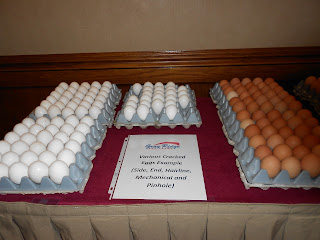Whistleblower Norman Bourdeau has filed an affidavit in court in Toronto which includes a chart with the egg-grading data for Ontario and Canada from 1997 to 2011.
And he writes "on review of the Ontario data between 2001 and 2002 there was more than a five per cent increase in Grade As.
"This time period was consistent with grading stations introducing changes in technology (which has now been 10 years) to detect cracks and dirts which allowed machine setting to include under-grades automatically in Canada Grade A.
"This practice could increase the risk of exposure to salmonella and other pathogens (as indicated by Health Canada).
Bourdeau notes that information the Egg Farmers of Ontario marketing board filed with its regulator, the Ontario Farm Products Marketing Commission, does not report volumes for Grade B or Nest Run eggs.
However, the Egg Farmers of Canada website indicates that the Egg Farmers of Ontario "as of week 39, 2012, had categories for Bs, Cs and Other," Bourdeau writes.
"The only reasonable conclusion that can be drawn is that Ontario Canada Grade A includes eggs that are not Canada Grade A."
Gray persistently denies any wrongdoing.
As interesting as this may be to the court proceedings Sweda Farms Ltd. has filed against the egg board, Gray and Burnbrae, it should be of far greater interest to the Ontario Farm Products Marketing Commission.
Egg farmers are paid more for Grade A eggs than undergrades, so there appears to be a consumer ripoff taking place.
Moreover, the egg board is funded by levies it collects from farmers, but only on Grade A eggs. It appears its revenues have been inflated by five per cent for the last 10 years.
And then there's the huge issue of food safety, an issue that ought to be of great concern to the commission and farmers.

If there is an outbreak of food poisoning that results in high-profile media coverage of the allegations Bourdeau is making in this affidavit, consumer confidence in eggs could be badly shaken and sales could plunge.
So far the egg board's lawyer, Geoffrey Spurr, has sought to condemn Bourdeau as a thief.
The board would be well advised to take Bourdeau's allegations and information seriously. At the very least, it should become proactive about food safety and take steps to ensure that there are no cracks and dirts in Grade A cartons.
It's not acceptable now to simply rely on the Canadian Food Inspection Agency to enforce egg-grading standards because it seems to have an inexplicable degree of tolerance for undergrades being marketed as Grade A eggs in Ontario.
And if Bourdeau's allegations and data are wrong, the egg board at least owes the public and its members a full explanation of how it has arrived at that opinion.